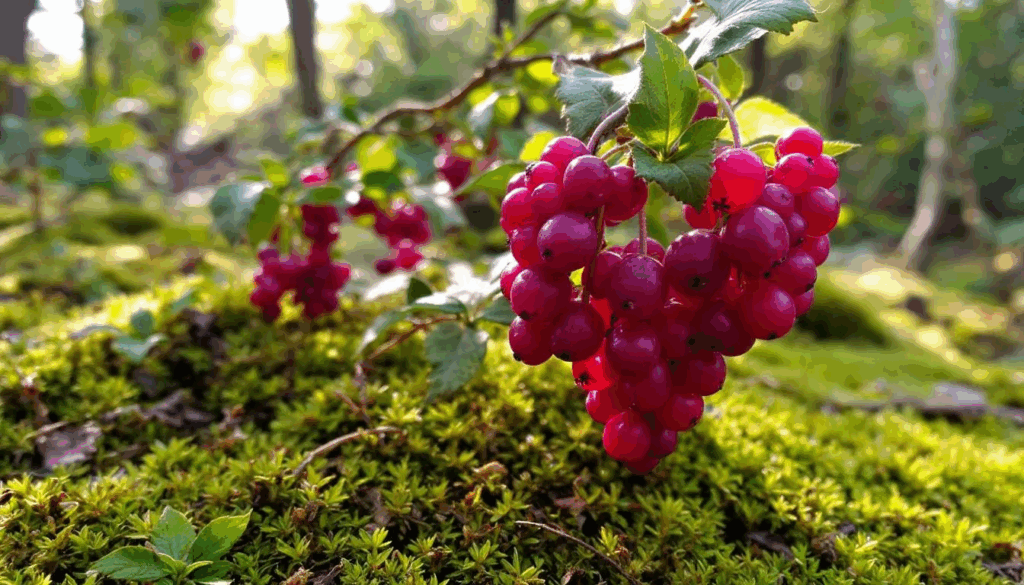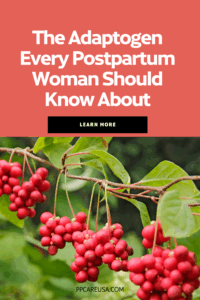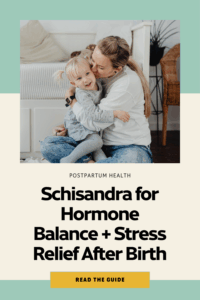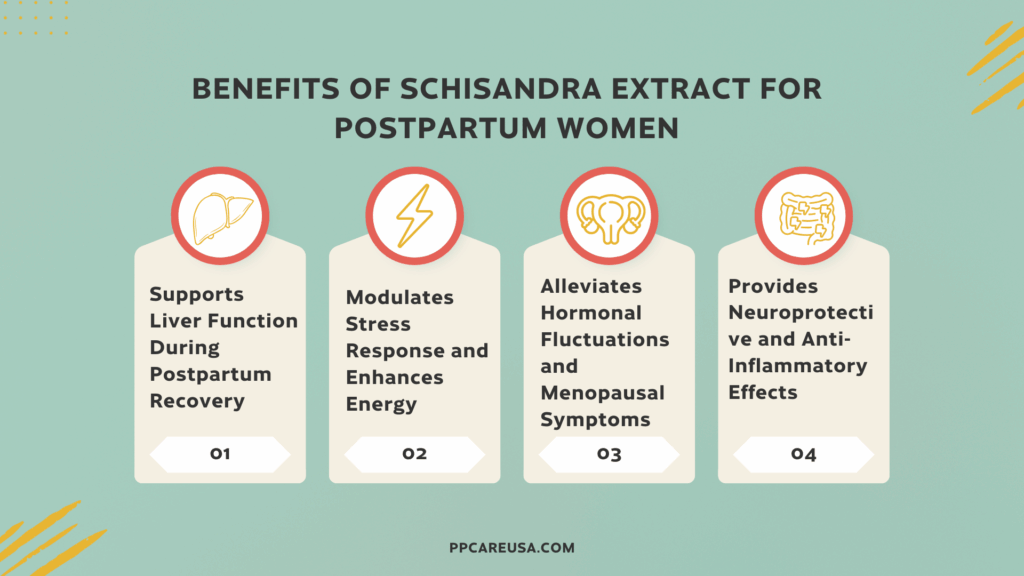As a postpartum nurse practitioner, I often seek natural, evidence-based approaches to support women’s health during their childbearing and postpartum years. This medicine staple used for over 2,000 years, is gaining attention for its potential to support liver health, modulate stress, and aid hormonal balance, making it particularly relevant for women navigating the physical and emotional demands of this life stage.
If you’re a woman in your reproductive years dealing with postpartum stress, hormonal fluctuations, or looking for natural ways to enhance your resilience and well-being, schisandra extract may offer valuable adaptogenic support. Below, I outline the benefits of schisandra extract tailored specifically for women in this age group.

What Is Schisandra Extract?
Schisandra extract comes from the purple-red berries of Schisandra chinensis, a fruit-bearing vine native to Northeast Asia. Known as the “five flavor fruit” because it contains sweet, salty, bitter, pungent, and sour tastes, this berry embodies the holistic balance central to traditional Chinese medicine (Source).
The extract is rich in lignans, specifically schisandrins A, B, and C, which are the primary bioactive compounds responsible for its adaptogenic and liver-supportive properties. Adaptogens like schisandra help the body maintain homeostasis during physical and emotional stress, a benefit especially important for postpartum women experiencing hormonal shifts and increased stress.
Key Bioactive Compounds and Mechanisms
Schisandrins A, B, and C have been studied extensively for their antioxidant and anti-inflammatory effects. According to a study published in Journal of Medicinal Food (Wang et al., 2018), these lignans enhance liver detoxification enzymes and support antioxidant systems, which is crucial for postpartum women whose bodies are processing hormonal metabolites and environmental toxins.
Furthermore, schisandra modulates cytochrome P450 enzymes, affecting drug metabolism—a consideration important for postpartum women on medications (Zhao et al., 2019). Its adaptogenic action helps regulate cortisol, the body’s primary stress hormone, supporting adrenal function and reducing the impact of chronic stress (Panossian & Wikman, 2010).
Benefits of Schisandra Extract for Postpartum Women
1. Supports Liver Function During Postpartum Recovery
The liver plays a key role in metabolizing hormones and clearing toxins, which is vital during postpartum recovery. Schisandra’s liver protective effects have been demonstrated in animal models showing reduced oxidative stress and improved liver enzyme function (Zhao et al., 2021, Environmental Research and Public Health).
In women recovering from childbirth, supporting liver function can aid hormonal balance and improve energy levels. A clinical study involving liver transplant patients found that schisandra extract increased blood concentrations of tacrolimus, a liver medication, while reducing side effects—highlighting its potential to support liver health in sensitive populations (Wang et al., 2010, International Journal of Clinical Pharmacology and Therapeutics).
Postpartum women with underlying liver disease or those at risk of developing liver conditions may find schisandra extract particularly beneficial. Liver disease during the postpartum period can complicate recovery and affect overall health.
Schisandra chinensis extract supplementation has demonstrated promising liver protective effects by reducing oxidative stress and inflammatory cytokines, which are key factors in liver damage progression. Animal studies and clinical trials have shown that schisandra enhances antioxidant capacity and supports the body’s resistance to liver injury, potentially aiding in the management of chronic hepatitis and fatty liver disease.
These benefits may help postpartum women maintain better liver function during a critical time of hormonal and metabolic adjustment, supporting overall recovery and well-being.
2. Modulates Stress Response and Enhances Energy
Postpartum women often face heightened stress and fatigue due to sleep deprivation and the demanding schedule of taking care of young children. Schisandra’s adaptogenic properties help normalize cortisol levels and improve the body’s resilience to stress. Panossian and Wikman’s 2010 review in Pharmaceuticals highlights schisandra’s role in reducing stress-induced fatigue and enhancing physical endurance.
Additionally, studies on cognitive tasks have shown that schisandra supplementation can improve mental clarity and reduce brain fog, common complaints among postpartum women (Zhao et al., 2017, Journal of Ethnopharmacology).
3. Alleviates Hormonal Fluctuations and Menopausal Symptoms
For women in their late 30s and 40s, schisandra may help ease hormonal fluctuations that precede menopause. A 2016 randomized, double-blind, placebo-controlled trial found that schisandra fruit extract significantly reduced menopausal symptoms such as hot flashes, night sweats, and heart palpitations without adverse effects (Panossian et al., 2016, Phytomedicine).
While postpartum women experience different hormonal shifts than menopausal women, the ability of schisandra to support hormonal balance and reduce symptoms related to estrogen fluctuations can be beneficial across reproductive stages.
4. Provides Neuroprotective and Anti-Inflammatory Effects
Schisandra’s antioxidant and anti-inflammatory properties may protect brain health, which is essential for postpartum women experiencing “mom brain” or cognitive fatigue. A 2017 study published in Frontiers in Pharmacology found that schisandra extract reduced amyloid beta accumulation and inflammatory cytokines in animal models of Alzheimer’s disease, suggesting neuroprotective potential (Zhao et al., 2017).
While more human studies are needed, these findings support schisandra’s role in promoting cognitive endurance and reducing inflammatory responses that may impact mood and brain function.
Forms and Dosage Recommendations
Schisandra extract is available in capsules, tinctures, powders, and traditional teas. Capsules offer standardized dosing of schisandrins, while teas provide a gentler introduction suitable for sensitive postpartum women.
Research supports doses ranging from 1.5 to 6 grams daily of standardized extract, but I recommend starting with lower doses and consulting a healthcare provider, especially if you are breastfeeding or taking medications (Wang et al., 2018).
Our supplement shop has a list of our favorite supplements curated by a postpartum and functional medicine specialist.
Safety Considerations
Schisandra extract is generally safe for healthy adults when used appropriately. Mild side effects such as heartburn or upset stomach may occur initially but usually resolve.
However, due to its effects on liver enzymes and drug metabolism, women taking medications—especially blood thinners or immunosuppressants—should consult their own physician before use (Zhao et al., 2019).
Pregnant and breastfeeding women should avoid schisandra unless under medical supervision due to limited safety data.
Conclusion
From my perspective as a postpartum nurse practitioner, schisandra extract offers promising, research-backed benefits for women in their 20s to 40s navigating postpartum recovery, hormonal fluctuations, and stress. Its liver protective, adaptogenic, and neuroprotective properties align well with the unique health challenges faced during these years.
Incorporating this wellness supplement, alongside a balanced diet, regular low intensity exercise, and supportive care, can enhance resilience and well-being. Always consult your healthcare provider before starting new supplements to ensure safety and personalized guidance.
If you’re ready to get a tailored supplement plan based on root-cause lab analysis, book a call with us to learn more about our plans.
References
- Panossian, A., & Wikman, G. (2010). Effects of adaptogens on the central nervous system and the molecular mechanisms associated with their stress—protective activity. Pharmaceuticals, 3(1), 188-224. https://doi.org/10.3390/ph3010188
- Panossian, A., et al. (2016). Efficacy of Schisandra chinensis fruit extract in treatment of menopausal symptoms: A randomized double-blind placebo-controlled trial. Phytomedicine, 23(3), 297-304. https://doi.org/10.1016/j.phymed.2015.11.005
- Wang, Y., et al. (2010). Effects of Schisandra sphenanthera extract on the pharmacokinetics of tacrolimus in liver transplant patients. International Journal of Clinical Pharmacology and Therapeutics, 48(12), 787-793. https://doi.org/10.5414/CPP48787
- Wang, Y., et al. (2018). Influence of extraction methods on the chemical composition and antioxidant activity of Schisandra chinensis fruit extracts. Journal of Medicinal Food, 21(5), 456-463. https://doi.org/10.1089/jmf.2017.4050
- Zhao, J., et al. (2017). Schisandrin B protects against amyloid beta-induced neurotoxicity in vitro and in vivo. Frontiers in Pharmacology, 8, 1-10. https://doi.org/10.3389/fphar.2017.00813
- Zhao, H., et al. (2019). Effects of Schisandra chinensis on cytochrome P450 enzymes and implications for drug interactions. Phytotherapy Research, 33(3), 731-739. https://doi.org/10.1002/ptr.6243
- Zhao, Q., et al. (2021). Schisandra fruit extract reduces oxidative stress and improves liver function in a fatty liver disease model. Environmental Research and Public Health, 18(5), 1-12. https://doi.org/10.3390/ijerph18052577



Postnatal Depletion
Meet the Team
Our Services
Supplements
A virtual healthcare clinic that helps postpartum mamas recover from postnatal depletion syndrome with a holistic approach.


Get in touch